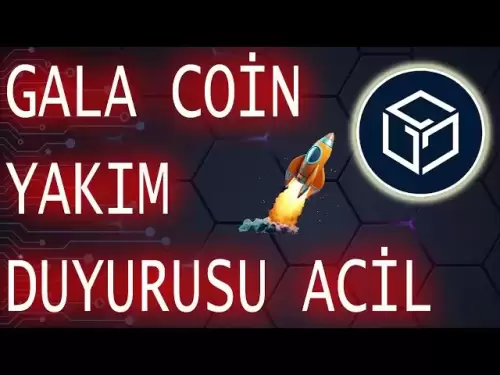-
 Bitcoin
Bitcoin $105,734.0170
-1.51% -
 Ethereum
Ethereum $2,414.7328
-3.26% -
 Tether USDt
Tether USDt $1.0002
0.00% -
 XRP
XRP $2.1748
-2.62% -
 BNB
BNB $647.5663
-1.72% -
 Solana
Solana $148.1710
-3.81% -
 USDC
USDC $0.9999
-0.01% -
 TRON
TRON $0.2799
-0.02% -
 Dogecoin
Dogecoin $0.1586
-4.17% -
 Cardano
Cardano $0.5440
-5.03% -
 Hyperliquid
Hyperliquid $37.0680
-6.59% -
 Bitcoin Cash
Bitcoin Cash $501.2052
-4.01% -
 Sui
Sui $2.6846
-3.47% -
 Chainlink
Chainlink $12.8488
-3.38% -
 UNUS SED LEO
UNUS SED LEO $8.9480
-1.51% -
 Avalanche
Avalanche $17.2059
-3.87% -
 Stellar
Stellar $0.2270
-4.75% -
 Toncoin
Toncoin $2.7889
-3.93% -
 Shiba Inu
Shiba Inu $0.0...01126
-1.76% -
 Litecoin
Litecoin $83.6893
-3.36% -
 Hedera
Hedera $0.1445
-4.49% -
 Monero
Monero $312.4014
-2.58% -
 Dai
Dai $1.0000
0.00% -
 Ethena USDe
Ethena USDe $1.0001
-0.01% -
 Polkadot
Polkadot $3.2920
-3.32% -
 Bitget Token
Bitget Token $4.4629
-1.81% -
 Uniswap
Uniswap $6.5386
-8.42% -
 Aave
Aave $260.3780
-6.01% -
 Pepe
Pepe $0.0...09308
-4.54% -
 Pi
Pi $0.4864
-3.04%
What chains does Trust Wallet support? How to switch networks?
Trust Wallet supports multiple blockchain networks like Ethereum, BSC, and Solana, allowing users to switch between them easily within the app for diversified crypto management.
May 04, 2025 at 05:50 am
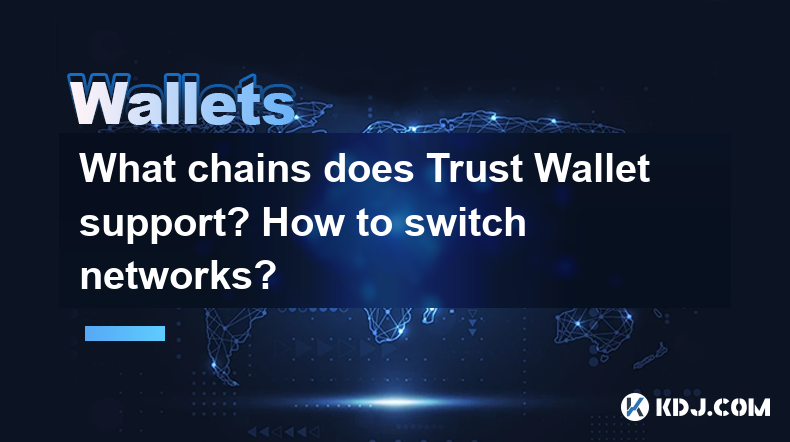
Trust Wallet is a popular multi-cryptocurrency wallet that supports a wide range of blockchain networks. This article will detail the various chains supported by Trust Wallet and provide a step-by-step guide on how to switch between these networks within the app.
Overview of Trust Wallet
Trust Wallet is a mobile wallet that allows users to store, send, and receive a variety of cryptocurrencies. It is known for its user-friendly interface and support for numerous blockchain networks, making it a versatile choice for crypto enthusiasts. The wallet is available for both iOS and Android devices and can be downloaded from their respective app stores.
Supported Chains in Trust Wallet
Trust Wallet supports a diverse array of blockchain networks, each with its own set of features and supported tokens. Here is a comprehensive list of the chains supported by Trust Wallet:
- Ethereum (ETH): The leading smart contract platform, supporting a vast ecosystem of tokens and decentralized applications (dApps).
- Binance Smart Chain (BSC): Known for its low transaction fees and high throughput, BSC is a popular choice for DeFi and other applications.
- Polygon (MATIC): A layer-2 scaling solution for Ethereum, offering faster and cheaper transactions.
- Solana (SOL): A high-performance blockchain known for its speed and scalability, supporting a growing ecosystem of dApps.
- Avalanche (AVAX): A platform designed for decentralized finance and enterprise blockchain applications, known for its high throughput.
- Fantom (FTM): A fast and scalable platform for dApps and digital assets, known for its low transaction fees.
- Arbitrum (ARB): A layer-2 scaling solution for Ethereum, designed to improve transaction speed and reduce costs.
- Optimism (OP): Another layer-2 scaling solution for Ethereum, focusing on scalability and user experience.
- Cronos (CRO): The blockchain platform of Crypto.com, supporting a range of DeFi and NFT applications.
- Harmony (ONE): A fast and secure blockchain with sharding technology, designed for scalability and low transaction fees.
- Tron (TRX): A blockchain platform focused on content sharing and entertainment, known for its high throughput and low fees.
- Bitcoin (BTC): The original cryptocurrency, supporting transactions and storage of Bitcoin.
- Bitcoin Cash (BCH): A fork of Bitcoin, designed to increase block size and improve transaction speed.
- Litecoin (LTC): A peer-to-peer cryptocurrency that enables instant, near-zero cost payments.
- Dogecoin (DOGE): A cryptocurrency that started as a meme but has gained significant popularity and utility.
- Cosmos (ATOM): A network of blockchains designed to scale and interoperate with each other.
- Polkadot (DOT): A platform that enables different blockchains to transfer messages and value in a trust-free fashion.
- Tezos (XTZ): A self-amending blockchain that can evolve and upgrade without hard forks.
- Stellar (XLM): A platform designed for fast, low-cost cross-border payments.
- VeChain (VET): A blockchain platform focused on supply chain management and business processes.
How to Switch Networks in Trust Wallet
Switching between different blockchain networks in Trust Wallet is a straightforward process. Here is a detailed guide on how to do it:
- Open Trust Wallet: Launch the Trust Wallet app on your mobile device.
- Access the Wallet Menu: Tap on the icon in the top-right corner of the screen to open the wallet menu.
- Select "Wallets": From the menu, select the "Wallets" option to view all your wallets and networks.
- Choose a Network: Scroll through the list of available networks and tap on the one you want to switch to. For example, if you want to switch to Binance Smart Chain, tap on "Binance Smart Chain".
- Confirm the Switch: Once you select a network, Trust Wallet will automatically switch to that network. You can now view your assets and perform transactions on the selected blockchain.
Benefits of Using Multiple Chains in Trust Wallet
Using multiple blockchain networks in Trust Wallet offers several advantages:
- Diversification: By supporting multiple chains, Trust Wallet allows users to diversify their cryptocurrency holdings across different networks, reducing risk.
- Access to Various Ecosystems: Each blockchain network has its own ecosystem of tokens, dApps, and services. Trust Wallet enables users to access and interact with these diverse ecosystems.
- Optimized Transactions: Different networks offer varying transaction speeds and fees. Users can choose the most suitable network for their specific needs, such as using BSC for low-cost transactions or Ethereum for accessing a wide range of dApps.
- Enhanced Security: Trust Wallet's support for multiple chains allows users to manage their assets securely across different networks, reducing the risk of centralized points of failure.
Managing Assets Across Different Chains
Managing assets across different blockchain networks in Trust Wallet involves understanding how to view, send, and receive tokens on each supported chain. Here are some key points to consider:
- Viewing Assets: Once you switch to a specific network, Trust Wallet will display the assets associated with that chain. For example, switching to Ethereum will show your ETH and ERC-20 tokens.
- Sending and Receiving: To send or receive tokens on a specific network, ensure you are on the correct chain. Use the "Send" or "Receive" buttons to initiate transactions. Make sure to double-check the network and recipient address to avoid errors.
- Token Swaps: Trust Wallet also supports token swaps within the app, allowing users to exchange tokens across different networks. To perform a swap, navigate to the "DApps" section, select a decentralized exchange like PancakeSwap or Uniswap, and follow the on-screen instructions.
Frequently Asked Questions
Q: Can I add custom tokens to Trust Wallet on different chains?
A: Yes, Trust Wallet allows users to add custom tokens on supported chains. To add a custom token, go to the specific network, tap on the "Add Custom Token" button, and enter the token's contract address, name, and symbol. The wallet will then display the token's balance if it is present in your wallet.
Q: Is it possible to use Trust Wallet on a desktop computer?
A: While Trust Wallet is primarily a mobile app, you can access it on a desktop computer using an Android emulator like BlueStacks or NoxPlayer. However, for the best experience and security, it is recommended to use the mobile app directly on your smartphone.
Q: How can I ensure the security of my assets across different chains in Trust Wallet?
A: To ensure the security of your assets, always use strong, unique passwords for your device and enable two-factor authentication (2FA) if available. Additionally, never share your recovery phrase with anyone and keep it stored securely offline. Regularly update the Trust Wallet app to benefit from the latest security enhancements.
Q: Can I stake tokens on different chains using Trust Wallet?
A: Yes, Trust Wallet supports staking for certain tokens on supported chains. To stake tokens, navigate to the specific network, select the token you want to stake, and follow the on-screen instructions to delegate your tokens to a validator. Staking rewards will be automatically credited to your wallet based on the network's rules.
Disclaimer:info@kdj.com
The information provided is not trading advice. kdj.com does not assume any responsibility for any investments made based on the information provided in this article. Cryptocurrencies are highly volatile and it is highly recommended that you invest with caution after thorough research!
If you believe that the content used on this website infringes your copyright, please contact us immediately (info@kdj.com) and we will delete it promptly.
- Crypto Trends 2025: MAGACOIN FINANCE Surges, Ethereum Mining Evolves, and XRP Payouts Innovate
- 2025-07-02 10:30:12
- Ethereum, MAGACOIN FINANCE, and Inflation: A Shift in Crypto Investor Focus
- 2025-07-02 10:30:12
- Kangaroos, Coin Purses, and a Hop Through Money History: You Gotta See This!
- 2025-07-02 10:50:15
- Arbitrum, Robinhood, and ARB Price: Is a Rebound on the Horizon?
- 2025-07-02 10:50:15
- Cryptos in 2025: Early Backers Cash In?
- 2025-07-02 10:55:17
- Lightchain AI: Bonus Round Buzz and Mainnet Activation on the Horizon
- 2025-07-02 11:10:12
Related knowledge
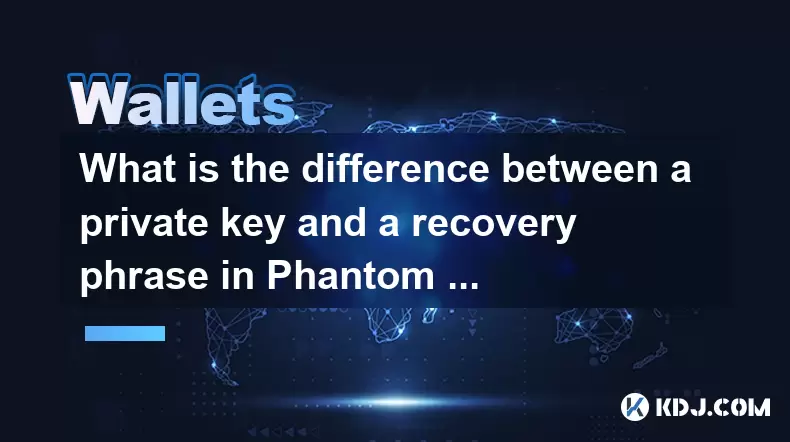
What is the difference between a private key and a recovery phrase in Phantom wallet?
Jul 02,2025 at 09:57am
Understanding the Basics of Phantom WalletPhantom wallet is a non-custodial digital wallet primarily used for interacting with the Solana blockchain. It allows users to store, send, and receive SOL tokens and other digital assets like NFTs. Non-custodial means that the user retains full control over their private keys and recovery phrases. Understanding...
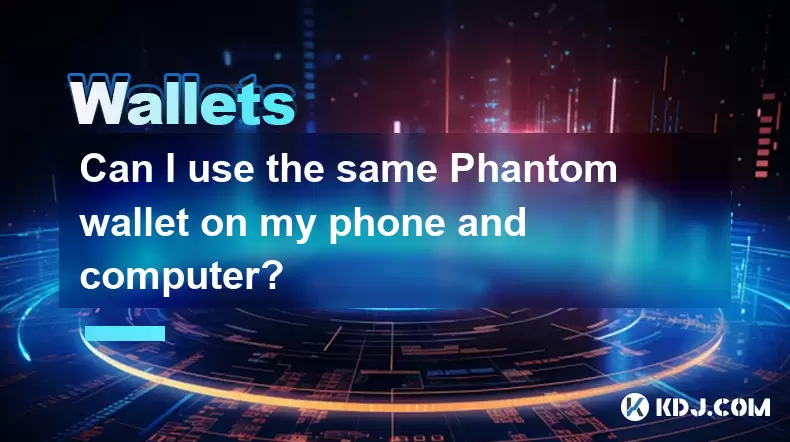
Can I use the same Phantom wallet on my phone and computer?
Jul 02,2025 at 10:04am
Phantom Wallet: Cross-Device CompatibilityPhantom wallet is a non-custodial cryptocurrency wallet designed primarily for interacting with the Solana blockchain. It supports both browser extensions and mobile applications, making it versatile for users who want to manage their digital assets across multiple devices. One of the most common questions among...
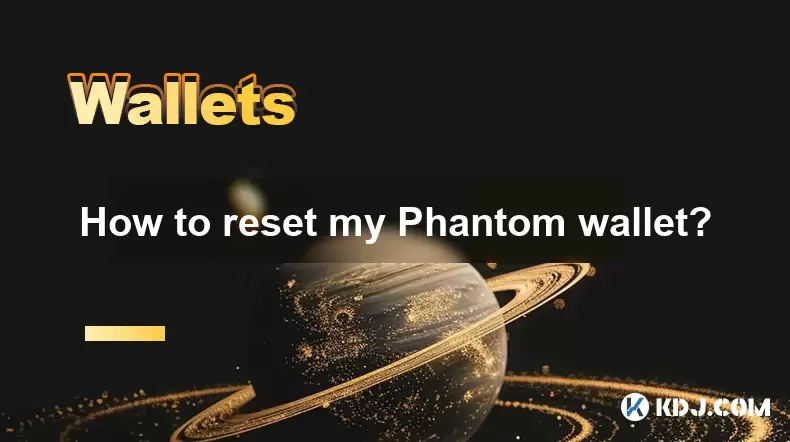
How to reset my Phantom wallet?
Jul 02,2025 at 12:36am
Understanding the Need for Resetting Your Phantom WalletIf you're using a Phantom wallet, you may encounter situations where resetting your wallet becomes necessary. This could be due to forgotten passwords, seed phrase issues, or account corruption. Phantom is a non-custodial wallet primarily used for interacting with the Solana blockchain, and it stor...
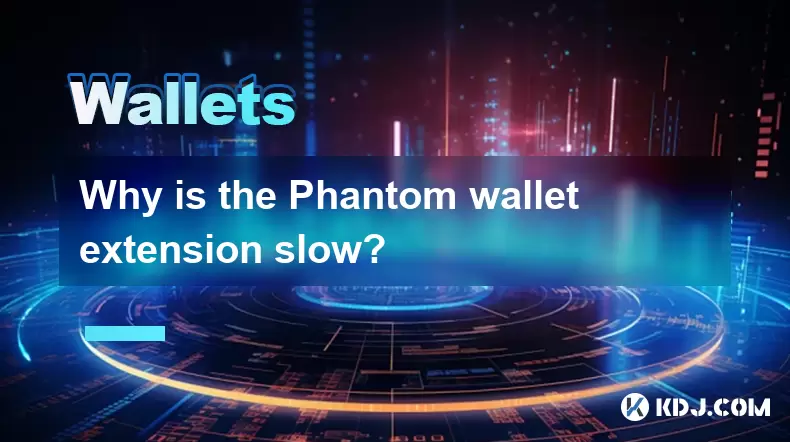
Why is the Phantom wallet extension slow?
Jul 02,2025 at 04:15am
Phantom Wallet Extension: Why Is It Slow?Phantom wallet is a widely used browser extension for interacting with decentralized applications (dApps) on the Solana blockchain. Despite its popularity, some users report that the Phantom wallet extension runs slowly at times. This article delves into potential reasons behind this performance issue and provide...
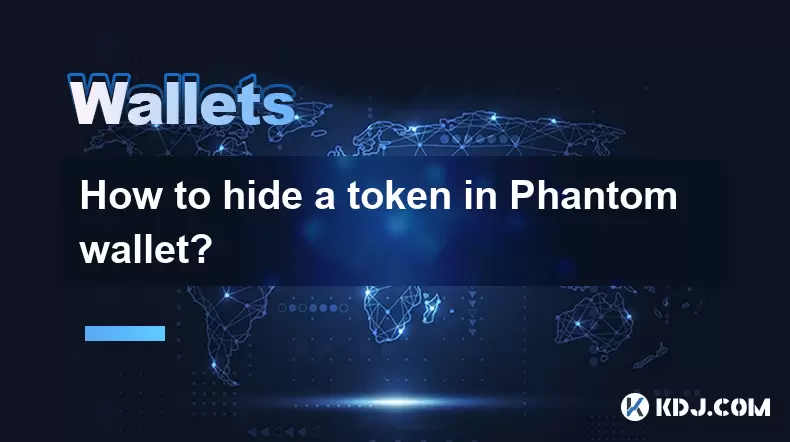
How to hide a token in Phantom wallet?
Jul 01,2025 at 05:49pm
Understanding the Phantom Wallet InterfacePhantom wallet is a popular non-custodial wallet used primarily for interacting with the Solana blockchain. It allows users to store, send, receive, and manage various tokens, including both fungible and non-fungible tokens (NFTs). Before attempting to hide a token, it's essential to understand how the wallet in...
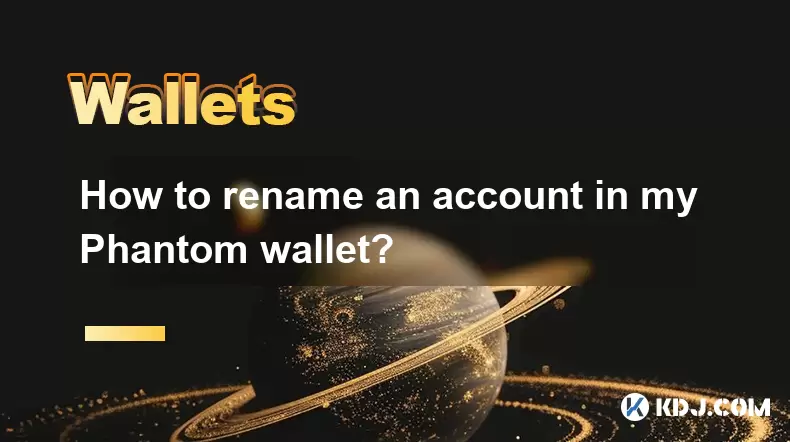
How to rename an account in my Phantom wallet?
Jul 02,2025 at 11:07am
Understanding Phantom Wallet Account ManagementPhantom wallet is one of the most popular non-custodial wallets for interacting with Solana-based decentralized applications (dApps) and managing digital assets. While it offers a user-friendly interface, some functionalities like renaming an account may not be immediately obvious to new users. It’s importa...

What is the difference between a private key and a recovery phrase in Phantom wallet?
Jul 02,2025 at 09:57am
Understanding the Basics of Phantom WalletPhantom wallet is a non-custodial digital wallet primarily used for interacting with the Solana blockchain. It allows users to store, send, and receive SOL tokens and other digital assets like NFTs. Non-custodial means that the user retains full control over their private keys and recovery phrases. Understanding...

Can I use the same Phantom wallet on my phone and computer?
Jul 02,2025 at 10:04am
Phantom Wallet: Cross-Device CompatibilityPhantom wallet is a non-custodial cryptocurrency wallet designed primarily for interacting with the Solana blockchain. It supports both browser extensions and mobile applications, making it versatile for users who want to manage their digital assets across multiple devices. One of the most common questions among...

How to reset my Phantom wallet?
Jul 02,2025 at 12:36am
Understanding the Need for Resetting Your Phantom WalletIf you're using a Phantom wallet, you may encounter situations where resetting your wallet becomes necessary. This could be due to forgotten passwords, seed phrase issues, or account corruption. Phantom is a non-custodial wallet primarily used for interacting with the Solana blockchain, and it stor...

Why is the Phantom wallet extension slow?
Jul 02,2025 at 04:15am
Phantom Wallet Extension: Why Is It Slow?Phantom wallet is a widely used browser extension for interacting with decentralized applications (dApps) on the Solana blockchain. Despite its popularity, some users report that the Phantom wallet extension runs slowly at times. This article delves into potential reasons behind this performance issue and provide...

How to hide a token in Phantom wallet?
Jul 01,2025 at 05:49pm
Understanding the Phantom Wallet InterfacePhantom wallet is a popular non-custodial wallet used primarily for interacting with the Solana blockchain. It allows users to store, send, receive, and manage various tokens, including both fungible and non-fungible tokens (NFTs). Before attempting to hide a token, it's essential to understand how the wallet in...

How to rename an account in my Phantom wallet?
Jul 02,2025 at 11:07am
Understanding Phantom Wallet Account ManagementPhantom wallet is one of the most popular non-custodial wallets for interacting with Solana-based decentralized applications (dApps) and managing digital assets. While it offers a user-friendly interface, some functionalities like renaming an account may not be immediately obvious to new users. It’s importa...
See all articles





















